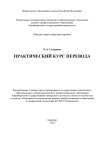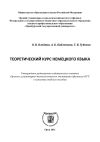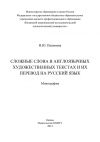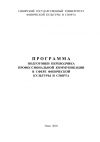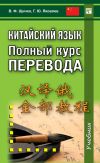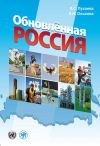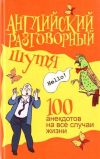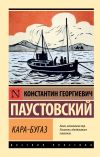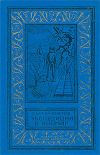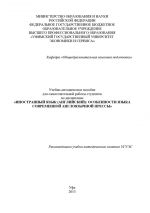
Автор книги: А. Яковлева
Жанр: Педагогика, Наука и Образование
сообщить о неприемлемом содержимом
Текущая страница: 2 (всего у книги 8 страниц) [доступный отрывок для чтения: 2 страниц]
2.2. Лексические особенности англоязычных газетных текстов
Важной особенностью английской общественно-политической лексики является универсальность её семантики. Так, в газетных заголовках часто употребляются слова, представляющие собой так называемый «заголовочный жаргон»: ban, bid, claim, crack, crash, cut, dash, hit, move, pact, plea, probe, quit, quiz, rap, rush, slash, boost и др., которые употребляются в различных значениях.
Значительную часть лексического состава англоязычных печатных СМИ представляют неологизмы, которые легко образуются в английском языке при помощи конверсии, сокращений и аффиксации.
При образовании неологизмов, свойственных газетному стилю, аффиксы могут развивать значения, ранее им не свойственные. Так, например, англосаксонский суффикс – ship ранее употреблялся для образования отвлеченных имен существительных со значением состояния, положения, например: friendship, leadership, lordship. В газетной лексике суффикс -ship с морфемой – man образует отвлеченные имена существительные се значением качества, признака: brinkmanship, craffmanship, oneumanship, showmanship.
Непродуктивный в настоящее время суффикс – dom обрел продуктивность в газетном стиле (Например: bangdom, bogdom, suckerdom).
Глагольный суффикс – ise(ize) также широко используется для образования газетных неологизмов (factionalize – выдумывать; itemize – рассматривать и т.д.).
Cреди общеупотребительных префиксов более частотными являются anti, – pre-; anti-apartheid, anti-fascist, pre-capitalist, pre– election [Комиссаров 1990]. Подобными способами могут образовываться и авторские контекстуальные неологизмы (окказионализмы): “They will be honored at a ceremony at Book Expo America and in Publishers Weekly’s pre-BEA issue on April 25” (http://www.huffingtonpost.com/2011/03/15/ ).
Одной из специфических черт газетного вокабуляра является широкое употребление усеченных слов. Например: In their Coalition agreement, the Conservatives and the Lib Dems promised that by the next election in 2015, no one would pay income tax on earnings below £10,000. (Lib Dems – Liberal Democrats) (http://www.telegraph.co.uk/news/politics).
Популярны в прессе и аббревиатуры: GP (general practioner), PC (police constable), MP (military police), PM (prime minister) и др., причем значения некоторых аббревиатур становится понятными только после прочтения статьи. В газетных текстах принято использовать одни и те же выражения из номера в номер. Это так называемые газетные штампы; их разделяют на две группы: словосочетания, употребляющиеся всегда в одном составе и словосочетания, допускающие вариативность состава. Первая группа представлена большим разнообразием структур, как например «прилагательное +существительное» (joint research); «глагол +существительное» (to have priority); «существительное + существительное + существительное» (space exploration program); «прилагательное + существительное + существительное» (manned space flight); «глагол + предлог + существительное» (to be in effect).
Вторая группа представляет собой лексему, обладающую высокой частотностью в газетных текстах и варьирующееся лексическое окружение. Например слово сommunity употребляется в различных словосочетаниях: national community; world community [Комиссаров 1990].
Употребление в газетных сообщениях постоянно одних и тех же выражений образует публицистические фразеологизмы, обладающие терминологическими чертами и употребляющиеся в основном только в газетном стиле. Например: to give front-page prominence, a far-reaching effect; to relax tension; to be under consideration и др.
Характеризуя лексические особенности ой публицистики, И. Р. Гальперин разделяет понятия газетного сообщения и газетной статьи. Газетным сообщениям присущи краткость, отсутствие субъективнооценочных элементов языка, претенциозностью, которая рассчитана на привлечение внимания читателя. «Как следствие, такой как бы сухой, несколько протокольной манеры изложения мысли, в газетных сообщениях нет образности, здесь не встречаются ни метафоры, ни метонимии, ни другие приемы образности» [Гальперин 1958, 397].
В отличие от газетных сообщений в газетных статьях широко употребляются образные элементы языка, так как цель статьи – воспроизвести яркий образ происходящих событий. При этом частое употребление в статьях метафоричных выражений приводит к тому, что они постепенно теряют свою эстетическую функцию и превращаются в газетные штампы. Например: allimportant fact; balanced judgment; course of action; a bitter quarrel; to have clean hands, to wrap in fog и др.
Оченочный характер газетной лексики выражается использованием сложных прилагательных: “With comedy that ranged from the laugh-out-loudobvious to the slow-burning subtlety that you only 'got' the morning after, this is decidedly good and appropriate theatre to watch in snowy Suffolk!” (http://news.bbc.co.uk/local/ ).
Лексика англоязычных печатных СМИ, также как и русскоязычных, носит разноплановый характер. Так, в газетных статьях можно и профессиональные термины (в основном общественно-политического и экономического характера), и литературно-книжную, и разговорную лексику.
В современной англо-американской таблоидной прессе используются как традиционные, так и авторские паремии и фразеологизмы. Окказиональные трансформации общеизвестных паремий позволяют автору оригинальным образом выразить определенную точку зрения. Например: "When in Rome do as the Romans, when in The Netherlands do as The Netherlands does" (http://news.bbc.co.uk/2/hi/europe/5162044.stm).
Англоязычные таблоиды также изобилуют разговорной лексикой и сленгом: MP Chuka tells Government: «Get a grip» (http://www.mirror.co.uk/news/top-stories/); 48 hours to stop a nuke disaster (http://www.mirror.co.uk/) (nuke – разг. от nuclear).
Традиционно используются в общественно-политических текстах эвфемизмы, которые способны в разной мере манипулировать сознанием реципиента. При употреблении политических эвфемизмов происходит замена одного понятия другим. Так, например, слова slump и depression могут заменяться следующими синонимами: recession, a rolling readjustment, a correction, a slippage, an easing, a downswing, a mild dip, a normal adjustment, a levelling off, a lull, a return to normalcy, an industrial trouble.
Формирование эвфемизмов представляет собой сложный лингвокультурологический процесс, отражающие изменения, происходящие в обществе. Использование эвфемизмов способствует образованию новых фразеологических единиц, политических клише, развитию семантики определенных лексем. Так, например, выражение “defence umbrella”, используемое как эвфемизм, когда речь идет о вооружении, приобрело значение «защитное прикрытие»: There has been unease in Israel over Secretary of State Hillary Clinton's comments about a regional «defence umbrella», should Iran acquire a nuclear weapon (http://news.bbc.co.uk/2/ ).
Итак, лексический состав современных англоязычных печатных СМИ отличается высокой степенью стандартизации (большой процент клишированных выражений, речевых штампов). Согласно происходящим событиям в конкретный период времени отмечается высокая частотность употребления определенных лексем. Иногда мы сталкиваемся с лексическими единицами, определяющими новые явления общественной действительности, что в некоторой степени может затруднить понимание текста.
Для английского языка характерно частое образование неологизмов, усечение длинных лексем, особенно активно это проявляется в прессе.
Таким образом, в газетных текстах наблюдается постоянное взаимодействие устойчивых и подвижных лексических элементов.
Авторы газетных материалов стремятся создать впечатление объективного и нейтрального отношения к происходящим событиям, при этом яркость подачи материала достигается использованием экспрессивной лексики наряду с нейтральной, что, безусловно, позволяет воспроизвести наиболее полную картину описываемых событий и фактов.
2.3. Стилистические особенности англоязычных газетных текстов
В англоязычных общественно-политических газетных текстах в качестве стилистических приемов используются различные выразительные средства (лексические, морфологические, синтаксические, фонетические), основанные на авторском эмоциональном восприятии определенных явлений и являющиеся механизмами коммуникативного воздействия на общество.
Несмотря на то, что англоязычным общественно-политическим текстам свойственен более нейтральный тон сообщений о текущих событиях, чем российским, в газетных текстах все же активно используются стилистически экспрессивные средства. Журналист не может оставаться абсолютно равнодушным к происходящему. Эмоционально-экспрессивный компонент в речи достигается благодаря использованию тропов. Сухое перечисление фактов может оказаться недостаточным для восприятия информации, несмотря на четкую логику высказываний. Задача автора создать образ, как можно более яркий и выразительный. Присутствие стилистически маркированных элементов в прессе всегда предполагает некоторый субъективизм в оценках. Посредством использования эпитетов, метафор, сравнений и других тропов автор способен выразить свою позицию, как открыто, так и завуалировано.
Например: “The sobering element of today's development is the reminder to all Australians that the threat of terrorism is alive and well, and this requires continued vigilance on the part of our security authorities," said Australian Prime Minister Kevin Rudd”(http://news.bbc.co.uk/2/hi/). В данном примере автор дает определенную оценку событиям путем использования метафоричных фраз “sobering element ” и “ the threat of terrorism is alive and well ”. Определенную экспрессию общественно-политическому тексту придает использование эпитетов. Например: Japanese emperor 'deeply worried' (http://www.bbc.co.uk/news/world).
Использование гиперболы также носит эмфатический характер:
"Every dollar we save from these measures helps to save jobs, and in the long-term, maintain service for Chicagoans," he said (http://news.bbc.co.uk/2/hi/).
Стилистические особенности современной публицистики неразрывно связаны с культурой определенной страны, с менталитетом её граждан. В основе таких тропов как ирония, сарказм, парадокс, оксюморон лежит юмор, который является отражением общественно-политических и культурных реалий определенной страны.
Ирония в англо-американской прессе может носить мягкий, зачастую юмористический характер. Эффект иронии иногда достигается путем использования таких оксюморонов как divine failure, happily divorced, open secret и др. Так, весьма иронично звучит заголовок Fran Drescher's 'Happily Divorced' (http://www.huffingtonpost.com/2011/03/15/ ).
Юмористический эффект достигается использованием различного рода каламбуров, в основе которых лежат лингвокультурологические особенности. Так, например, в следующих предложениях представлены случаи парономазии (фигуры речи, состоящей в комическом или образном сближении слов, которые вследствие сходства в звучании и частичного совпадения морфемного состава могут ошибочно, но чаще каламбурно использоваться в речи): «Cooperation, not confrontation» was the way forward, he said, with climate change, security and the economy all areas where common ground existed (http://news.bbc.co.uk/2/hi); How Old Is Old Age? (http://query.nytimes.com/search). Wish you were heir? (http://www.mirror.co.uk/).
Зачастую в англо-американские печатные СМИ вкрапляются изречения известных личностей, ставшие афоризмами, а также известные цитаты из литературных произведений, фильмов, песен и прочих произведений искусства, составляющих часть массовой культуры. Например: “The Business of America Is Business” (“Business is business”) (http://www.humanevents.com/article.php). “During the civil war, Khartoum operated a divide and rule policy, trying to foster ethnic splits within the southern rebels, and then arming breakaway militias to fight against them” (“Divide and rule”) (http://news.bbc.co.uk/2/hi/).
Особенностью англо-американской публицистики является частое использование в качестве перифразов цитат или окказиональных авторских изречений, как, например, в следующем заголовке: “Prince Andrew in new 'cash for favours' row” (http://www.telegraph.co.uk/).
В англоязычных газетных заголовках часто используются стилистические фигуры, придающие фразе фонетическую привлекательность ( в т.ч. эпифора, анафора, хиазм). Например: 10 women, 10 awful outfits, 10 reasons to feel a bit smug (oh and Florence Welch wearing granny's knitting bag) (http://www.mirror.co.uk). Now you sea it, now you don’t (http://www.thesun.co.uk/sol/ ).
Иногда стилистические фигуры не несут никакой дополнительной информации во фразе, но придают ей эмоциональную окраску.
В современной прессе часто можно встретить графические окказионализмы, выполняющие аттрактивную функцию. Например: You need thairapy! (http://www.thesun.co.uk/sol). Графический окказионализм построен при помощи слияния лексем “hair” и “therapy”.
Так, экспрессивное использование языковых средств нередко связано с отклонением от общеупотребительных норм, но именно благодаря таким отклонения автор способен более четко раскрыть суть существующих проблем, воспроизвести наглядный образ действительности.
3. ПРАКТИЧЕСКИЕ РЕКОМЕНДАЦИИ ПО РАБОТЕ С СОВРЕМЕННЫМИ АНГЛОЯЗЫЧНЫМИ ГАЗЕТНЫМИ ТЕКСТАМИ
Работу с газетными текстами облегчит выполнение следующих рекомендаций:
– при переводе газетной статьи учитывайте перечисленные выше грамматические, лексические и стилистические особенности;
– переведите сначала всю статью, а затем уже заголовок, так как часто полный смысл заголовка раскрывается после прочтения статьи целиком;
– используйте список популярных газетных штампов и аббревиатур;
– названия англоязычных печатных изданий, иностранных фирм, компаний акционерных обществ, монополий, концернов, фирменные марки машин, приборов, изделий, иностранные фамилии и собственные имена не переводятся;
– географические названия и научно-технические термины следует заменять русскими эквивалентами;
– сохраняется национальное своеобразие специфических слов и выражений, связанных с особенностями быта и общественной жизни, историей, географическими и климатическими условиями;
– записывайте в тетрадь не только незнакомые слова, но и речевые обороты, пословицы, афоризмы, которые в газетных текстах могут получить авторскую трансформацию;
– большинство слов многозначны. Подумайте над выбором правильного значения лексической единицы.
4. УПРАЖНЕНИЯ НА РАЗВИТИЕ НАВЫКОВ РАБОТЫ С СОВРЕМЕННОЙ АНГЛОЯЗЫЧНОЙ ПРЕССОЙ
Task 1: Explain the usage of the following verb forms; compare them with the meaning of tense forms used in the common language (объясните использование следующих глагольных форм; сравните их со значениями временных форм, употребляемых в обычном языке).
1. Today you get your driving licence, tomorrow we start on the rules of the road (http://www.ft.com/intl/cms/s/).
2. Somali Pirates release Belgian ship crew (http://edition.cnn.com).
3. Taliban steps up election terror campaign (http://www.independent.co.uk).
4. Former South Korean leader dies (http://europe.wsj.com).
5. Russia sacks minister after suicide bomb kills 20 (http://www.independent.co.uk).
6. This mistake is not going to happen again. We're not going home (http://thestar.com.my/news).
7. “Russell Brand gets a gorillagram and 10 boxes of bananas for his birthday” (http://www.mirror.co.uk).
8. “Clinton To Visit Egypt, Tunisia Next Week” (www.huffingtonpost.com/2011/02/21).
9. Israel seizes French yacht as it heads to Gaza Strip (http://news.scotsman.com).
10. Russia sacks minister after suicide bomb kills 20 (http://www.independent.co.uk).
Task 2: Translate the following sentences, pay attention to the different meanings of the underlined words (переведите следующие предложения, обратите внимание на разные значения выделенных слов).
1. They will argue that the system breaches international law (http://www.guardian.co.uk/business/2011/jun/05/).
2. It was a close fight, but I can't argue with the decision (http://www.guardian.co.uk/sport/2011/jun/05/).
3. There are very few hard and fast rules in life (http://www.huffingtonpost.com/76658837679124);
4. The rest of the industry is growing faster and outpacing consoles (http://www.latimes.com/business/).
5. His column on Gessler the other day was absolutely priceless. Is it any wonder nobody wants to buy ad space?.. (www.huffingtonpost.com/susan-greene).
6. Inter lost their opening game 1-0… (www.football.thestar.com.my/story.asp?file=/2011/9/21);
7. Mr Humphreys eventually lost his patience, took the boy by the collar and marched him to his gate (http://www.bbc.co.uk/news/uk-scotland).
8. Pending Sales Of Existing Homes Hit Drop By 11.6 Percent In April (http://www.huffingtonpost.com/2011/05/27/).
9. Tracking Economy, CO2 Emissions Hit New High (http://dotearth.blogs.nytimes.com/2011/05/30/).
Task 3: Translate the sentences, paying attention to the meanings of the journalese (переведите предложения, обращая внимание на значения газетных штампов).
1. United States would consider extending a “defense umbrella” over the Middle East… (http://www.nytimes.com/2009/07/23/).
2. Clinton lands in Pakistan to ‘reset’ relations (http://www.ft.com/cms/s/0/128).
3. Suzuki has denied that the deal broke the agreement (http://www.bbc.co.uk/news/business-14877009).
4. Some we are getting already – from our friends in the free world (http://www.bbc.co.uk/news/mobile/world-africa-13345413).
5. John Boehner Leaves Debt Ceiling Talks With Obama (http://www.huffingtonpost.com/2011/07/22).
6. Hailing a «peaceful revolution» in Russian politics for the first time since the collapse of the Soviet Union in 1991, Kremlin officials and Putin supporters relished a relatively harmonious relationship between the legislature and the executive (http://www.guardian.co.uk/world).
7. Clinton is visiting Athens on the second leg of a 12-day around-the-world diplomatic tour (http://biz.thestar.com).
8. …it lost two of six contested seats, leaving it with just a bare 17-16 majority (http://www.nypost.com).
9. John Boehner Leaves Debt Ceiling Talks With Obama (http://www.huffingtonpost.com/2011/07/22).
10. With Help From NATO, Libyan Rebels Gain Ground (www.nytimes.com/2011/05/10).
Task 4: Analyze the underlined linguistic means (проанализируйте выделенные языковые средства).
1. Lady Gaga is like a car accident; you don’t want to look but just can't help yourself (www.huffingtonpost.com/2011/06/01/).
2. Will Scotland Go Its Own Way? (http://www.nytimes.com/2012/02/ 27opinion).
3. Mr Drake's fiancée, Sophie Lindop, commented: "I am relieved that our battle for justice is now over, but it doesn't take away the anger I feel that Malcolm should still be alive today (http://www.bbc.co.uk/news/uk-england-stokestaffordshire-14747805).
4. Youngsters yet to get any experience of work are at the bottom of the pile and youth – unemployment has hit 34 per cent (http://www.mirror.co.uk/news/topstories/2011/05/29/).
5. Does writing for other artists afford you the luxury of spreading your wings when you make solo records? (http://www.bbc.co.uk/news/).
6. He was a quiet and friendly man but was beaten and left for dead in his own home in what I would describe as a cruel and heartless attack. (http://news.bbc.co.uk/2/hi/uk_news/england/west_midlands/8624818.stm).
7. Divine failure stamped upon your life (www.cnbc.com/).
8. In politics, life can change in an instant (http://www.guardian.co.uk/theobserver/2010/dec/19/).
9. Tom Daley devasted after his father Rob loses his battle with cancer aged just 40 (http://www.mirror.co.uk/news).
10. France has to take the bitter pill of economic reform (http://www.huffington post.com/healthy-living/).
11. Bad Trips: Wonderful Essays About Awful Travel Experiences (http://www.huffingtonpost.com).
12. New Orleans Mayor Mitch Landrieu, who invited the Justice Department last year to conduct a thorough review of the police department, said the verdicts «provide significant closure to a dark chapter in our city's history» (http://www.usatoday.com/news).
13. Rescuers struggled to reach survivors on Saturday morning as Japan reeled after an earthquake and a tsunami struck in deadly tandem (http://www.nytimes.com/2011/03/12).
14. Egypt's military junta is facing its biggest crisis of legitimacy (http://www.guardian.co.uk/world).
15. Their final moments alive were hell on earth (http://www.nypost.com).
16. Röthig said IKB’s management took to the idea “as a baby takes to candy” until 2005 when he said the bank was taking too much risk… (http://www.efinancialnews.com/story/2011-08-12/).
17. Nothing better personified the arrogance and the anarchy; the mindless, violent consumerism (http://news.scotsman.com/opinion).
18. Did Germany sow the seeds of the eurozone debt crisis? (http://www.bbc.co.uk/news/world).
19. It says people have become "screen slaves" and are often working while commuting or after they get home (http://www.bbc.co.uk/news/health-18490433).
20. This oasis of learning is in blighted Englewood, one of Chicago's toughest and poorest areas (http://www.bbc.co.uk/news/world-us-canada-15224200).
Task 5: Explain the origin of the underlined expressions (объясните происхождение выделенных выражений).
1. Ultimate Fighting's Cold War Gets Hotter (http://www.time.com/time).
2. Unreal Estate: News You Won't Believe (http://www.huffingtonpost.com/ 2011/06/28).
3. iPhone overview: Apple of discord (http://www.gsmarena.com/apple).
4. Problem? All you need is love (http://www.timesplus.co.uk/tto/news/).
5. After the Split, Madonna's Show Must Go On (http://www.people.com/people).
6. Mourinho described progress to the final as «mission impossible» (http://football.thestar.com).
7. «Do you, comrade, remember Afghanistan? Glows of fires, Muslim cries?» I am sure British soldiers have their own songs, it's just I don't know them. God bless them anyhow (http://www.guardian.co.uk/commentisfree).
8. Scottish fishermen need 'no stone to be left unturned'(http://www.bbc.co.uk/ news/uk-scotland).
9. You have to love Lanni’s cold dish of revenge served up for the chamber folks (http://www.lasvegassun.com/news/2008/jun/18/irony-lannis-proposal/).
10. Lanni has taken us back to the future with a proposal, first reported by the Sun (http://www.lasvegassun.com/news/2008/jun/18/irony-lannis-proposal/).
Task 6: Mark the famous expressions, used in the following sentences (отметьте известные выражения, используемые в следующих предложениях).
1. Barack Obama: A Wolf in Sheep's Clothing (http://www.humanevents.com/article).
2. The former head of England’s failed bid to host the 2018 World Cup finals spilled the beans today on alleged corruption in world football, naming four top Fifa officials who personally solicited cash or favours from him (http://www.thetimes.co.uk/tto/news/).
3. A Mentor to a Nation of Prodigious Runners Shows That Charity Begins at Home (http://www.people.com/).
4. To Be or Not to Be: American Freedom, Exceptionalism and Identity (http://www.huffingtonpost.com).
5. As the saying goes, the early bird catches the worm. Zambia has shown that the only obstacle in going to Germany for the World Cup is the actual competition not taking place! (http://news.bbc.co.uk/sport2).
6. Syria 'a hair's breadth' from civil war (http://news.bbc.co.uk/today/hi/today).
7. Britney Cries: Life Is Like Jail, Groundhog Day (http://www.people.com/people/0,,,00.html).
8. Price rise 'a storm in a teacup' (http://news.bbc.co.uk/today/hi/today/newsid).
9. No news was bad news: the little space-chic craft, carrying a painting by Damian Hirst and an audio test signal by Blur, vanished without trace (http://www.bbc.co.uk/news/science).
10. Congress is going to be a hard nut to crack, though (http://news.bbc.co.uk/2/hi/americas/2252234.stm).
Task 7: Find the pun in the underlined words (найдите каламбур в подчеркнутых словах) .
1. Wish you were heir? (http://www.mirror.co.uk/).
2. Raise a Glass – and Some Money – for Lydia Tillman, Casa Mono's Beloved Former Sommelier (http://blogs.villagevoice.com/).
3. Сivil servants splash your cash (http://www.mirror.co.uk/).
4. Peter Jones: After the party is over the party politics really begin (http://news.scotsman.com/opinion/).
5. Disunited Kingdom? (http://www.guardian.co.uk/).
6. Donald Trump trumped as senior Republicans acknowledge the obvious (http://news.scotsman.com).
7. Sir Paul McCartney turns 70 years young today (http://www.cnn.com/2012/06/18/happy).
8. iPhone, You Phone, We All Wanna iPhone (http://www.bbc.com/news/technology).
9. Makeup artists’ lawsuit doesn’t powder over dispute with Cosmetology Board (http://www.lasvegassun.com/news/2012/jun/20).
10. Parenting – Children Need Presence More Than Your Presents (http://ezinearticles.com/?Parenting).
Task 8: Match the headlines with the fragments of the articles (сопоставьте заголовки с фрагментами статей).
1. How Old Is Old Age?
2. Obama: Indefinitely Holding Detainees 'Gives Me Huge Pause'.
3. 'New' GM on the road.
4. Will New Ad Restart the Engines?
5. Clinton moves to calm Moscow over remarks by Biden.
6. In Moldovan Vote, It's East vs. West.
7. Georgia's Unmet Promise.
8. Kirill's Visit Exposes Dangers in Moscow-Kiev Ties.
1. Imagine you're a huge American company that has built its reputation on durability, reliability and being the biggest damn dog on the street. Then let's say you get into horrible, disastrous debt and have to go begging to the government, like a sad little stray. And then you still end up in Chapter 11. Your customers are peeved because they have to bail you out. Your frailty makes them wary of buying anything from you. And every wrong thing you've ever done (like, say, making the Pontiac Aztek,) nags at them like a stain you put on their best rug. How do you make a commercial for that?
2. After a six-week trip through bankruptcy, the "new" General Motors was born Friday – owned by the government, free of tens of billions in debt, and shed of unaffordable brands, dealerships and plants. CNNMoney.com reports the sale of the valuable assets of the old company to the new GM was completed Friday morning. full story.
3. The public’s views on age and aging are explored in a new national survey on aging from the Pew Research Center, explained in a story by my colleague Sarah Arnquist.
Most adults over age 50 feel at least 10 years younger than their actual age, the survey found. One-third of those between 65 and 74 said they felt 10 to 19 years younger, and one-sixth of people 75 and older said they felt 20 years younger.
And at what age does old age begin? Most people in the survey said old age starts at age 68. Are they kidding? That seems way too young to me. Not surprisingly, most people over 65 have a different idea about old age. Among those getting the senior citizen discount, most say old age begins at 75.
4. President Obama still has reservations about the prospect of indefinitely holding those detained at the Guantanamo Bay military prison, and he may not follow through on his administration's intention to develop such a policy, he told the Associated Press today.
"It gives me huge pause," he told the news organization in an interview.
Obama's intention to close the detention facility in Cuba – announced on his first full day in office – has forced difficult decisions about what to do with the detainees still there. The administration is trying to send some to other countries and hopes to try others in courts or military tribunals.
5. A year ago, Russia and Georgia went to war. The anniversary has renewed debate about the causes of the conflict and the future of the Caucasus region. Our country's main focus now should be on helping Georgia cultivate the institutions that will promote democratic development and stability. Georgia has made considerable progress in physical recovery over the past year, but its political environment remains fragile and polarized, with a muzzled media, weak civil society and demonstrations in the streets.
6. It was Kirill’s first trip to Ukraine since he was elected patriarch in January. The visit opened on July 27 with an affirmation of Russian-Ukrainian brotherhood in Kiev, regarded as the cradle of Russian Orthodoxy. Prince Vladimir adopted Orthodoxy from Byzantium for himself and his subjects, who were baptized en masse in the Dnieper River in 988.
7. Hillary Clinton, US secretary of state, yesterday sought to head off a spat with Russia after it was angered by comments by Joe Biden, US vicepresident.
The Kremlin had demanded clarification of remarks in which Mr Biden suggested Russia would be forced to improve relations with the US because its economy was "withering".
8. Moldovans repeating national elections on Wednesday face a stark choice: vote for the ruling Communist Party and receive loans from their Chinese and Russian backers worth well over a third of national income, or put their faith in the West.
The outcome of the vote is too close to call, according to opinion polls and political analysts, though few expect a repeat of the riots and brutal police crackdown that followed April's turbulent elections that were tainted by fraud allegations.
Внимание! Это не конец книги.
Если начало книги вам понравилось, то полную версию можно приобрести у нашего партнёра - распространителя легального контента. Поддержите автора!Правообладателям!
Данное произведение размещено по согласованию с ООО "ЛитРес" (20% исходного текста). Если размещение книги нарушает чьи-либо права, то сообщите об этом.Читателям!
Оплатили, но не знаете что делать дальше?